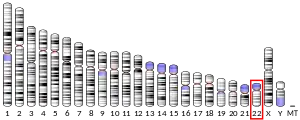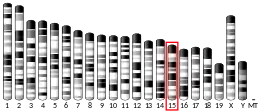SMCR7L
Mitochondrial dynamic protein MID51 (MID51) also known as mitochondrial elongation factor 1 (MIEF1) or Smith-Magenis syndrome chromosome region candidate gene 7 protein-like (SMCR7L) is a protein that in humans is encoded by the SMCR7L gene.[5][6][7]
Function
The SMCR7L gene codes for a protein that has been called MiD51/MIEF1 and shown to regulate mitochondrial fission by interacting with the proteins Drp1 and FIS1.[8]
References
- GRCh38: Ensembl release 89: ENSG00000100335 - Ensembl, May 2017
- GRCm38: Ensembl release 89: ENSMUSG00000022412 - Ensembl, May 2017
- "Human PubMed Reference:". National Center for Biotechnology Information, U.S. National Library of Medicine.
- "Mouse PubMed Reference:". National Center for Biotechnology Information, U.S. National Library of Medicine.
- Wiemann S; Weil B; Wellenreuther R; Gassenhuber J; Glassl S; Ansorge W; Bocher M; Blocker H; Bauersachs S; Blum H; Lauber J; Dusterhoft A; Beyer A; Kohrer K; Strack N; Mewes HW; Ottenwalder B; Obermaier B; Tampe J; Heubner D; Wambutt R; Korn B; Klein M; Poustka A (Mar 2001). "Toward a catalog of human genes and proteins: sequencing and analysis of 500 novel complete protein coding human cDNAs". Genome Res. 11 (3): 422–35. doi:10.1101/gr.GR1547R. PMC 311072. PMID 11230166.
- Andersson B; Wentland MA; Ricafrente JY; Liu W; Gibbs RA (Jun 1996). "A "double adaptor" method for improved shotgun library construction". Anal Biochem. 236 (1): 107–13. doi:10.1006/abio.1996.0138. PMID 8619474.
- "Entrez Gene: SMCR7L Smith-Magenis syndrome chromosome region, candidate 7-like".
- Dikov, D.; Reichert, A. S. (2011). "How to split up: Lessons from mitochondria". The EMBO Journal. 30 (14): 2751–2753. doi:10.1038/emboj.2011.219. PMC 3160261. PMID 21772324.
Further reading
- Yu W, Andersson B, Worley KC, et al. (1997). "Large-scale concatenation cDNA sequencing". Genome Res. 7 (4): 353–8. doi:10.1101/gr.7.4.353. PMC 139146. PMID 9110174.
- Dunham I, Shimizu N, Roe BA, et al. (1999). "The DNA sequence of human chromosome 22". Nature. 402 (6761): 489–95. doi:10.1038/990031. PMID 10591208.
- Hartley JL; Temple GF; Brasch MA (2001). "DNA cloning using in vitro site-specific recombination". Genome Res. 10 (11): 1788–95. doi:10.1101/gr.143000. PMC 310948. PMID 11076863.
- Simpson JC, Wellenreuther R, Poustka A, et al. (2001). "Systematic subcellular localization of novel proteins identified by large-scale cDNA sequencing". EMBO Rep. 1 (3): 287–92. doi:10.1093/embo-reports/kvd058. PMC 1083732. PMID 11256614.
- Strausberg RL, Feingold EA, Grouse LH, et al. (2003). "Generation and initial analysis of more than 15,000 full-length human and mouse cDNA sequences". Proc. Natl. Acad. Sci. U.S.A. 99 (26): 16899–903. doi:10.1073/pnas.242603899. PMC 139241. PMID 12477932.
- Jin J, Smith FD, Stark C, et al. (2004). "Proteomic, functional, and domain-based analysis of in vivo 14-3-3 binding proteins involved in cytoskeletal regulation and cellular organization". Curr. Biol. 14 (16): 1436–50. doi:10.1016/j.cub.2004.07.051. PMID 15324660.
- Wiemann S, Arlt D, Huber W, et al. (2004). "From ORFeome to biology: a functional genomics pipeline". Genome Res. 14 (10B): 2136–44. doi:10.1101/gr.2576704. PMC 528930. PMID 15489336.
- Rual JF, Venkatesan K, Hao T, et al. (2005). "Towards a proteome-scale map of the human protein-protein interaction network". Nature. 437 (7062): 1173–8. doi:10.1038/nature04209. PMID 16189514.
- Mehrle A, Rosenfelder H, Schupp I, et al. (2006). "The LIFEdb database in 2006". Nucleic Acids Res. 34 (Database issue): D415–8. doi:10.1093/nar/gkj139. PMC 1347501. PMID 16381901.
This article is issued from Wikipedia. The text is licensed under Creative Commons - Attribution - Sharealike. Additional terms may apply for the media files.






